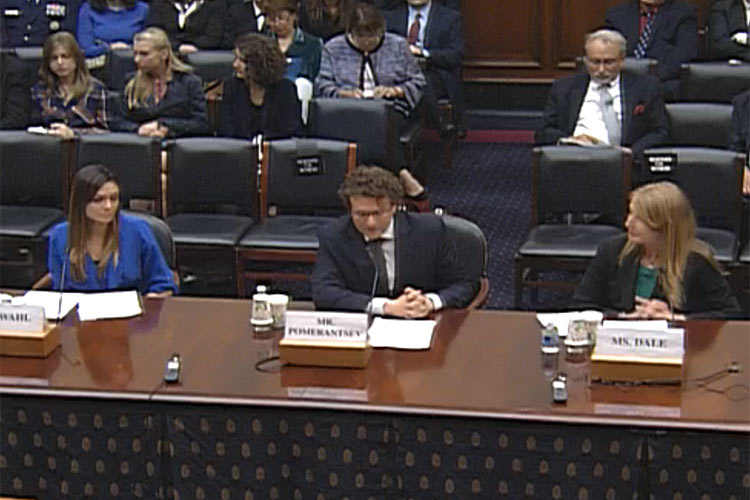On April 15, the House Committee on Foreign Affairs, chaired by Representative Ed Royce (R-CA), held a hearing to examine the nature of Russia’s global misinformation campaign and its effects on U.S. security, as well as to identify the shortcomings in U.S. efforts to confront Russian propaganda.
The hearing called on witnesses Peter Pomerantsev, senior fellow at the Legatum Institute; Helle C. Dale, senior fellow for public diplomacy at the Heritage Foundation; and Elizabeth Wahl, former RT Anchor, to testify about the threat of Kremlin misinformation.
The Kremlin spends hundreds of millions of dollars every year on its media channels and “troll” farms to undermine the West in a cloud of confusion, Pomerantsev said. Through the “weaponization of information,” he said, the Kremlin’s aim is to show that “Western, and specifically American, promises of security are empty” and that whole nations can collapse before Putin’s feet without Russia even firing a shot. Rather than attempting to push a particular agenda, the Kremlin intends to “trash the information space with so much disinformation, a conversation based on actual facts would become impossible.” The intention is eventually to discourage anyone from seeking the truth, he said. “This is not merely an information war, but a war on information.”
Wahl witnessed firsthand this war on information while at RT, where “it didn’t matter how credible the voices were, as long as the underlying message was reinforced—that the U.S. and the West is crumbling, corrupt, and hypocritical.” Wahl said that while RT claims to be “simply providing another perspective,” it is in fact deceiving Western media organizations into believing there is no such thing as objective truth and giving “strength to Russia’s lies in the struggle to maintain balance.”
Representative Dana Rohrabacher (R-CA) called for Americans to have more discipline in searching for the truth, saying, “We don’t need another Cold War, [and] we don’t need to take such a belligerent stance.” He argued that “there is a little bit of fanaticism on both sides” and some media bias on both sides. Wahl responded that while the U.S. media is “not perfect,” rhetoric like Rohrabacher’s creates the false sense that Western media and Kremlin propaganda are equivalent. It ignores essential differences, she said, such as the fact that Russian media’s “intent is actually to advocate and manipulate a war for an authoritarian leader’s foreign policy objectives.”
Another cause for concern is the political, economic, and intellectual elites around the world who toe the Kremlin line behind closed doors, Pomerantsev said, arguing that these individuals are potentially more dangerous than media outlets like RT.
What can be done to counter Kremlin misinformation? The general consensus at the hearing was that the U.S. is failing to counter the Kremlin narrative effectively. Last year, the House unanimously passed the United States International Communications Reform Act of 2014 (H.R. 4490), introduced by Royce and Representative Eliot Engel (D-NY), which aimed to improve the effectiveness of U.S. international broadcasters. But Dale noted that the Broadcasting Board of Governors (BBG) has yet to be reformed and stressed that “at present, it is our most important tool in this information war.” He said that U.S. state-funded media suffer from budget constraints, a shortage of staff, and a limited audience in Russia. For example, Voice of America (VOA) no longer broadcasts in Russia, and while VOA does offer Internet-based content in Russian, “VOA’s Russian service website ranks number 3,828 in Russia,” Dale said.
Pomerantsev said that when addressing Kremlin misinformation, the U.S. should aim to find local voices to cover local issues. Asked by Representative Gregory Meeks (D-NY) what the U.S. could do to expand the array of media sources available to Russians, Pomerantsev replied that there is no shortage of opinions but rather a lack of “that central pillar of education and understanding of how you think rationally, critically.”
Royce, Wahl and Dale agreed that “untruth should be fought with truth,” but Pomerantsev said that it’s not enough to expose the truth as the U.S. did during the Cold War. The West needs to devise more clever tactics, he said. Dale recommended trying to expose the truth through new independent organizations, while Wahl said it was important for people to consider the source of news stories and to think carefully before sharing and retweeting.
Pomerantsev concluded by warning the representatives about the power of technology. The war of the 21st century, he said, is a permanent informational-psychological war, and he predicted there may come a time when wars will be decided by “whose storyline wins, not [by] what happens on the ground.”
IMR released a report last year on Russian propaganda titled “The Menace of Unreality: How the Kremlin Weaponizes Information, Culture, and Money.” It is available for download here.


